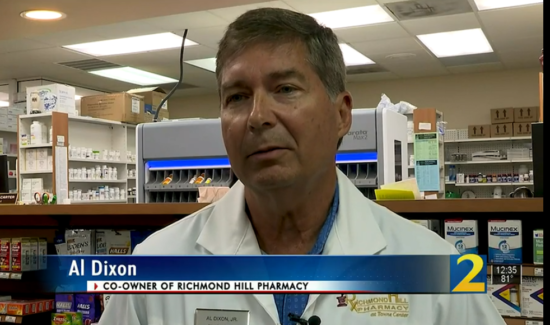CDC relaxes (for now), CVS has big plans, Georgia gets Covid-testing kiosks, and more
05 Aug 2022
Posted by Andrew Kantor
Covid kiosks
It’s 3:00 am and you’re not in a Denny’s mood. How about getting a Covid test instead? Good news: The Georgia Department of Public Health has opened a bunch* of 24/7 kiosks throughout the state offering free tests. (Here’s the map.)
Fill out the quick form and the kiosk dispenses a kit. Swab, dip, etc., and put it back in the kiosk. The next day it’ll be picked up and given a super-accurate PCR test — you’ll be notified of the results by email or text.
* We didn’t bother to count.
It’s a license renewal year
Pharmacists, do you have enough continuing ed under your belt to renew your license? If not, no worries — GPhA has ways of making you talk helping you meet your requirements tout de suite, and get some spiffy certificates for your wall while you’re at it.
APhA’s Pharmacy-Based Immunization Delivery Certificate Training Program
Gives you 23.0 hours of CPE (in person plus home study)!
In-person sessions: Sunday, August 21 —or— Sunday, December 11 (8:00 am – 5:00 pm) in GPhA’s Sandy Springs classroom
Click here for details and to register.
APhA’s Delivering Medication Therapy Management Services Certificate Training Program
Gives you 21.0 hours of CPE (in person plus home study)!
Live via Zoom; Sunday, September 18 (8:00 am – 5:00 pm)
Click here for details and to register.
NASPA’s Pharmacy-based Point-of-Care Testing Certificate Program
Gives you 20.0 hours of CPE (in person plus home study)!
In-person session: Sunday, October 2 (8:30 am – 12:30 pm) in the GPhA Sandy Springs classroom Click here for details and to register.
You can call him Al
A big GPhA Buzz shout-out to GPhA member Al Dixon of Richmond Hill Pharmacy in Bryan County, who was featured in a WSB-TV story on rising drug prices. Specifically, it was based on AARP of Georgia s reminding everyone that drug prices have risen “73% in the last seven years, hurting Georgia’s seniors.”
And who’s to blame? PBMs.

(Yeah, the article misspelled his name. Over and over. )
CDC say relax
The CDC is expected to update it’s don’t-get-Covid guidelines in the next few days “to ease quarantine recommendations for people exposed to the virus and de-emphasize 6 feet of social distancing.” It’s also going to “de-emphasize regular screening testing for Covid-19 in schools” and stick with its test-to-stay strategy.
All this, of course, assumes that there won’t be a major surge when students return to school and an unexpected definition of “cultural studies.”
Monkeypox updates
Urgent, urgent, emergency
It’s now officially a public health emergency in the US. That just means more hyperactive news stories … and more importantly, “Federal health officials can now expedite preventative measures to treat monkeypox” and have some more flexibility in how they do it.
Luckily, it’s rarely fatal (but very uncomfortable) and only spread through intimate skin-to-skin contact.
Whither TPOXX?
There’s a monkeypox vaccine (although it can be hard to get), but what about treatments? One that’s out there is TPOXX (aka tecovirimat) which is approved to treat monkeypox’s nasty cousin, smallpox. And while TPOXX has been tested for monkeypox on animals, it’s still officially an investigational drug when it comes to humans. So if you want to use it here in the US of A, that means paperwork. Lots of paperwork.
Will that change now that this is an emergency? Should it? Read on.
Eeew
The Brits have identified new symptoms of the disease. Upon reading the headline, I thought to share those new symptoms with you. Upon reading the article, however, I prefer to simply provide the link.
For those of you who clicked and read, here’s a picture of a bunny and a kitten:

When moles go bad
Some moles don’t know their place. Rather than sit still and maybe be the subject of an awkward glance, they start to grow until they become melanoma, the really bad skin cancer.
Why do some have to be that way? Who hurt them? Who did this to them?
Boston University researchers think they know. If they’re right, it could open the door to treatments not only for melanoma (and pre-melanoma) but potentially other types of cancer.
It’s all about the Hippo tumor suppressor pathway which, to oversimplify, tells cells when to stop growing. When the Hippo tumor suppressor pathway is itself suppressed, “those cells rapidly go on to form melanoma in multiple experimental models.” Keep it working properly, and moles stay moles.
Next up, as always, more research.
CVS on the bandwagon, but who’ll drive it?
CVS announced that it’s joining Amazon, Walgreens, and that group of hobos under the bridge and getting into the primary care business.
The company wants to offer longer hours at its doctor [sic] offices so people can visit as early as 6 a.m., as late as 9 p.m., or on the weekends.
Completely unrelated, America’s physician shortage continues to the point that Time magazine is offering solutions.
Also unrelated, a new study out of the University of Chicago found that “It would take a primary care physician 26.7 hours per day to follow national recommendation guidelines for preventative, chronic disease and acute care for an average number of patients.”
Disinfecting: Better, stronger, faster
The Brits are simply not satisfied with how well bleach works to kill germs. It’s just too slow. A northern-England hospital had an idea: a disinfectant based on hypochlorous acid, a natural compound that also comes from chlorine and is used in the U.S. as a disinfectant.
They call their product Pathisol, and researchers at Teesside University (home of Barry the Beaver) are testing it in a clinical environment for the first time, misting entire wards with the stuff.
The benefit, if it pans out: “Pathisol can disinfect a surface in two minutes, which is five times faster than bleach. It can also kill 99.99% of pathogens, including hospital superbug Clostridium difficile.”
It’s also cheaper to make than bleach and more environmentally friendly — and you get to apply with a cool spray gun.



